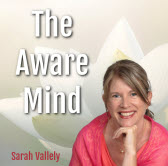I’m thrilled to share that I had a conversation with Sarah Vallely, the wonderful host of The Aware Mind podcast. It was truly a delight to be a part of her show, discussing the intricate dynamics of relationships, the role of the nervous system in conflicts, and strategies for fostering healthier connections.
If you’re someone who enjoys listening to absorb content rather than reading it, I encourage you to listen to the recorded interview on Sarah’s website. You can find the episode by visiting this link: The Aware Mind Podcast. Simply scroll to the bottom of the page to access the recording and immerse yourself in the wonderful dialogue Sarah and I had in the most recent episode, ‘Deescalating Feelings of Anger and Frustration During Times of Conflict with your Partner.’
Delving into Relationship Dynamics
In the complex landscape of relationships, emotions often run deep, and conflicts can emerge from seemingly innocuous triggers. Sarah and I delved into the intricate interplay between our nervous system and conflicts, shedding light on how understanding this connection can address inevitable conflicts and improve relationships. We explored how certain triggers, often stemming from past experiences, can set off a cascade of reactions within us and impact our interactions with loved ones.
The Nervous System’s Silent Influence
An aspect we delved into was the remarkable role of the nervous system in conflicts. The way someone’s tone of voice or a particular gesture can transport us back to past pain is fascinating and complex. Through our dialogue, we unearthed how our autonomic nervous system, often beyond conscious control, can initiate responses like fight, flight, freeze, collapse, or submit. Understanding that these responses are not choices but involuntary reactions can pave the way for empathy and better conflict resolution.
The Power of Mindful Responses
Mindfulness, with its capacity to ground us in the present moment with compassion and without judgment, emerged as a significant tool in our discussion. By acknowledging and naming our emotions and sensations, we can deescalate the heightened state of our amygdala, the brain’s fear center. This practice empowers us to take a step back from immediate emotional reactions and respond more thoughtfully, thereby transforming conflicts into opportunities for growth.
Communication and Validation
Effective communication forms the cornerstone of conflict resolution. We explored the art of validating one another’s emotions and experiences. I shared the significance of replacing accusatory statements with vulnerable “I” statements. This shift from finding fault to sharing vulnerability can significantly alter the trajectory of a conversation. Sarah and I exchanged thoughts on the power of validation in deescalating tense situations and creating space for open dialogue.
Validation plays a pivotal role in any conflict. When your partner expresses feeling unheard or misunderstood, reflecting on their emotions and validating their experiences can be an immediate deescalator. Instead of defending your position, respond with, “I understand that you’re not feeling heard. I want to understand and I’m fully present now. I’m here for you. Please say more.”
The Fire Drill Strategy
I also shared a practical approach known as the “Fire Drill.” If you’re a long-time reader, you’ve heard me mention it before. This technique involves preplanning responses to triggers and practicing them ahead of time. By being proactive and recognizing the early signs of emotional overwhelm, we can address our needs and emotions before conflicts escalate.
Please remember, navigating conflicts in relationships requires a deep understanding of our nervous system’s role in triggering reactions. By recognizing triggers as responses rather than threats, practicing mindfulness to name emotions, and fostering open communication with validation, we can effectively deescalate conflicts and promote healthier interactions.
Again, I invite you to consider the podcast episode as an enriching complement. If you’d like even more support in fostering healthier relationships and enjoying more understanding, connection, and joy, please also consider enrolling in my Repair Your Relationship Online program.
If you’d like to find out more, click the button below and schedule a free, 15-minute call. We’ll discuss how we may be able to help.

